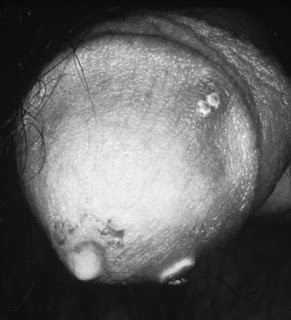Understanding Gonorrhea: Definition, Symptoms, Causes, Prevention, and Treatment
WHO estimates that 82.4 million people were newly infected with gonorrhea in 2020. Gonorrhea, also known as “ the Clap”, is a sexually transmitted infection (STI) caused by the bacterium Neisseria gonorrhoeae. It is one of the most common bacterial STIs worldwide and can affect both men and women. In this article, we will delve into the definition, symptoms, causes, prevention, and treatment of gonorrhea to help you better understand this prevalent infection.
.
CONTENTS
✰ What is Gonorrhea
✰ Symptoms of Gonorrhea
✰ Causes of Gonorrhea
✰ How to prevent Gonorrhea
✰ The best treatment for Gonorrhea
✰ Conclusion
✰This might be related and helpful
✰ WHAT IS GONORRHEA?
is a sexually transmitted infection (STI) caused by the bacterium Neisseria gonorrhoeae? It primarily affects the reproductive tract in both men and women, but it can also infect the mouth, throat, eyes, and rectum. Gonorrhea is one of the most common bacterial STIs globally, and it can have serious health consequences if left untreated.
The bacterium Neisseria gonorrhoeae is transmitted through warm and moist areas of the reproductive tract, including the urethra, cervix, rectum, and throat. sexual contact, including vaginal, anal, and oral sex, as well as from mother to baby during childbirth. It can also be transmitted through shared sex toys and other sexual practices. Individuals who engage in unprotected sex, have multiple sexual partners or engage in high-risk sexual behaviors are at an increased risk of contracting gonorrhea.
✰ SYMPTOMS OF GONORRHEA
Gonorrhea symptoms can vary depending on the gender of the person infected and the site of infection. Let's delve into the symptoms of gonorrhea in both men and women.
In men these include;
✐ Discharge from the penis: Men infected with gonorrhea may experience a discharge from the penis that can be white, yellow, or greenish. The discharge may have a foul odor and may be accompanied by a feeling of urgency to urinate.
✐ Pain or burning sensation while urinating: Gonorrhea can cause inflammation and irritation of the urethra, which can result in a painful or burning sensation while urinating.
✐ Swelling or redness at the open tip of the penis: The tip of the penis may become swollen and red in some cases of gonorrhea infection.
✐ Pain or discomfort in the testicles: Gonorrhea can also cause pain or discomfort in the testicles, which may be mild to severe.
In women, the symptoms of gonorrhea can be milder and include;
✐ Increased vaginal discharge: Women with gonorrhea may experience an increase in vaginal discharge that can be yellow or greenish. The discharge may have a strong odor and may be different from the usual vaginal discharge.
✐ Pain or burning sensation while urinating: Similar to men, women with gonorrhea may also experience pain or a burning sensation while urinating.
✐ Pain or discomfort in the lower abdomen or pelvic area: Gonorrhea can cause inflammation of the reproductive organs in women, leading to pain or discomfort in the lower abdomen or pelvic area.
✐ Vagina bleeding between periods after sexual intercourse: In some cases, gonorrhea infection can cause vaginal bleeding between periods or after sexual intercourse.
It's important to note that not all cases of gonorrhea cause symptoms, and some people may have asymptomatic gonorrhea, which means they may not experience any noticeable signs or symptoms. However, even in the absence of symptoms, gonorrhea can still be transmitted to others, underscoring the importance of regular STI screenings, especially for those who are sexually active or engage in high-risk sexual behaviors.
It's also worth mentioning that gonorrhea can affect other parts of the body, such as the rectum, throat, and eyes, depending on the site of infection. Rectal gonorrhea can cause symptoms such as anal discharge, pain, itching, and bleeding, while throat gonorrhea can cause a sore throat. If you suspect you may have been exposed to gonorrhea or are experiencing any of the symptoms mentioned above, it's important to seek medical attention promptly for appropriate testing, diagnosis, and treatment.
✰ CAUSES OF GONORRHEA
When it comes to the causes of gonorrhea, it is important to note that gonorrhea is a sexually transmitted disease (STD) caused by by the bacterium Neisseria gonorrhoeae. The bacteria can infect the mucous membranes in the genital, rectal, and throat areas, and it can be transmitted from one person to another through sexual contact, including vaginal, anal, or oral sex. Let's delve into the causes of gonorrhea in detail;
✐ Unprotected sexual contact: Engaging in sexual activity without using condoms or other barrier methods, such as dental dams, during oral, vaginal, or anal sex can increase the risk of contracting gonorrhea. This is particularly relevant to sexually active individuals, including young adults and adolescents, who may be engaging in sexual activities for the first time or have multiple sexual partners.
✐ High-risk sexual beahaviours: Certain sexual behaviors, such as having multiple sexual partners or engaging in high-risk sexual activities, such as unprotected sex with casual partners or engaging in sex work, can increase the risk of gonorrhea infection. It's important to educate the audience about the potential risks associated with specific sexual behaviors and encourage responsible sexual practices.
✐ Vertical transmission: Gonorrhea can also be transmitted from an infected mother to her baby during childbirth. This is known as vertical transmission or perinatal transmission. It's crucial to raise awareness among pregnant individuals about the importance of prenatal care, including routine STI screenings, to prevent transmission to the baby during childbirth.
✐ Bacteria resistance: Another important aspect of the causes of gonorrhea is the growing concern about antibiotic resistance. Overuse or misuse of antibiotics can lead to the development of antibiotic-resistant strains of Neisseria gonorrhoeae, making it more challenging to treat the infection. It's important to emphasize the need for responsible antibiotic use, following prescribed treatment regimens, and adhering to safe sex practices to prevent the emergence and spread of antibiotic-resistant strains of gonorrhea.
✐ Lack of awareness and education: Lack of knowledge or awareness about gonorrhea, its transmission, and prevention measures can also be a cause of the infection. Educating the audience about the risks, symptoms, and preventive measures associated with gonorrhea can help raise awareness and promote responsible sexual health practices.
✰ EFFECTIVE MEASURES TO PREVENT GONORRHEA
Certainly, prevention is the best drug for every sickness around the globe, preventing gonorrhea is crucial to reduce the spread of the infection. Here is a detailed overview of how to prevent gonorrhea;
✐ Safe sex practice: Practicing safe sex is one of the most effective ways to prevent gonorrhea. This includes using condoms consistently and correctly during vaginal, anal, and oral sex. It's important to educate the audience about the proper use of condoms, including how to put them on and take them off correctly.
✐ Limited sexual partners: Reducing the number of sexual partners and avoiding high-risk sexual behaviors, such as having unprotected sex with multiple partners, can lower the risk of gonorrhea. Encouraging open communication about sexual history and promoting healthy sexual relationships can also play a significant role in prevention.
✐ Regular STI screaming: Regular screenings for gonorrhea and other sexually transmitted infections (STIs) are essential, especially for sexually active individuals or those with multiple sexual partners. Screening allows for early detection and timely treatment of gonorrhea, preventing its complications and further spread.
✐ Education and awareness: Raising awareness about gonorrhea, its transmission, symptoms, and prevention measures through education campaigns, health promotions, and community interventions can help individuals make informed decisions about their sexual health. Providing accurate and comprehensive information about gonorrhea and other STIs can empower individuals to take preventive measures.
✰ BEST APPROACH TO TREAT GONORRHEA
✐ Antibiotic therapy: Gonorrhea is a bacterial infection, and antibiotic therapy is the primary treatment. However, due to the growing concern of antibiotic resistance, it's crucial to use antibiotics judiciously and follow the prescribed treatment regimen. Treatment may involve a single dose or a combination of antibiotics, depending on the severity of the infection and the presence of any antibiotic resistance.
✐ Partner notification and treatment: It's important to notify and treat all sexual partners who may have been exposed to gonorrhea to prevent reinfection and further spread of the infection. Encouraging open communication with partners and discussing the importance of testing and treatment can help prevent reinfection and promote responsible sexual health practices.
✐ Follow-up testing: After completing the prescribed antibiotic regimen, follow-up testing is necessary to ensure the effectiveness of treatment and to detect any possible reinfection. It's important to emphasize the importance of completing the full course of antibiotics and adhering to follow-up testing as recommended by the healthcare provider.
✐ Safer sex practice during treatment: It's important to practice safe sex, including using condoms consistently and correctly, even during treatment for gonorrhea, to prevent reinfection or transmission of other STIs.
✐ Screening for other STIs: Gonorrhea often coexists with other STIs, such as chlamydia, syphilis, and HIV. Therefore, individuals diagnosed with gonorrhea should also be screened for other STIs to ensure comprehensive care and prevent further complications.
✰ CONCLUSION
Gonorrhea is a common sexually transmitted infection caused by the bacterium Neisseria gonorrhoeae. It can be asymptomatic, but when symptoms occur, they may include discharge, pain, or discomfort during urination and other genital or rectal symptoms. Gonorrhea can be easily transmitted through sexual contact, but it can be prevented by practicing safe sex, limiting sexual partners, getting regular STI screenings, avoiding sharing sex toys and practicing safe childbirth. If diagnosed with gonorrhea, prompt medical attention and adherence to prescribed antibiotics are crucial for the successful treatment and prevention of complications. Remember, prevention is key in controlling the spread of gonorrhea and other sexually transmitted infections. If you suspect you may have gonorrhea or have been exposed to someone with gonorrhea, don't hesitate to seek medical care and take steps to protect yourself and others.
✰ this might be related and helpful
✐How to prevent yourself from cancerhttps://ourhealth190.blogspot.com/2023/04/understanding-breast-cancer-symptoms.html
✐ The best approach for strokehttps://ourhealth190.blogspot.com/2023/04/every-3.html
✐ How to get rid of pimples naturally https://ourhealth190.blogspot.com/2023/04/say-goodbye-to-pimples-your-ultimate.html











Comments
Post a Comment